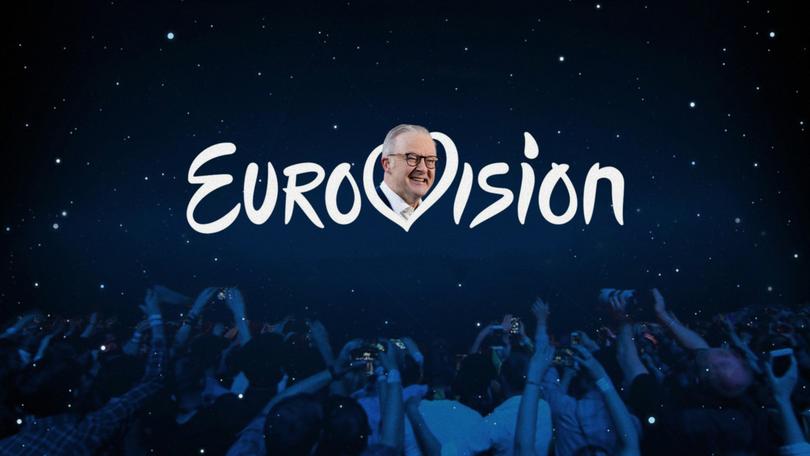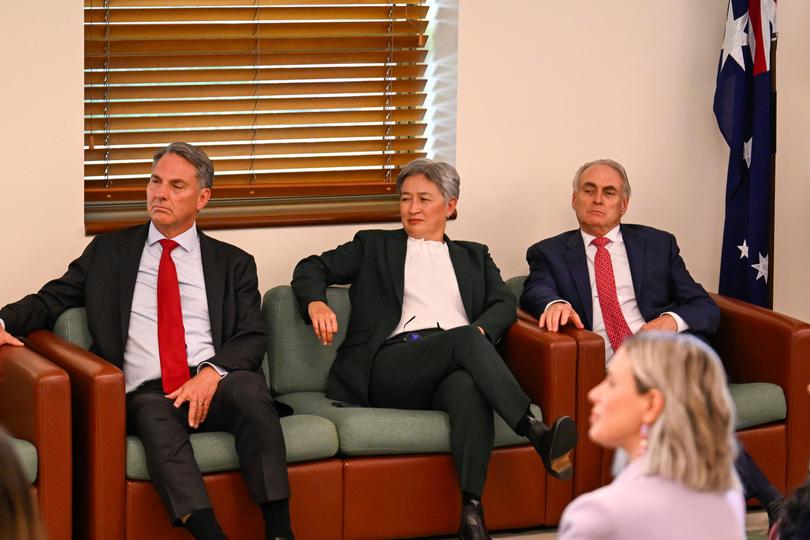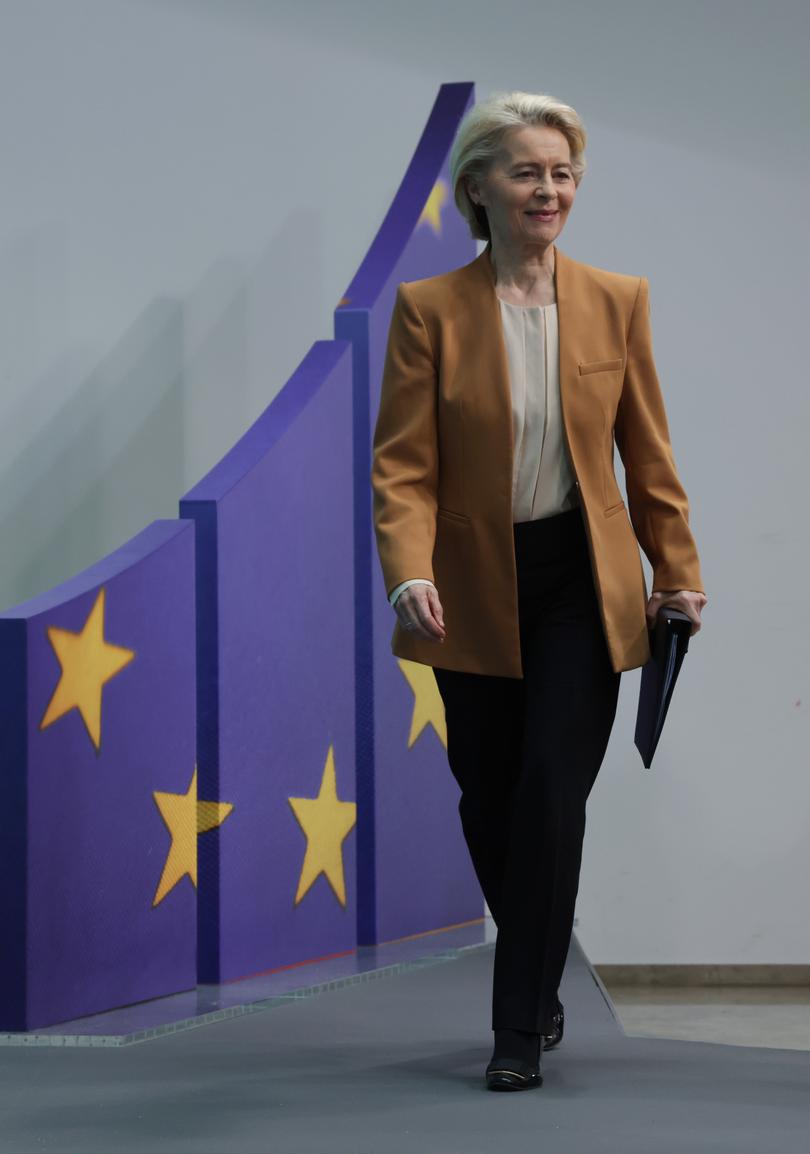LATIKA M BOURKE: Anthony Albanese’s Eurovision blinded by Labor’s factional party stoush
LATIKA M BOURKE: The decision to junk the EU call and delay it yet again, adds to growing concerns about a mismatch between the prime minister’s rhetoric and action.

For months, the European Commission President, Ursula von der Leyen has been trying to get a call with Anthony Albanese.
First, the message was sent via the Prime Minister’s national security adviser, a bureaucrat who formerly advised Julia Gillard, Kathy Klugman, that Mr Albanese was too busy dealing with Cyclone Alfred to speak.
Then the Europeans were told that the PM was now focused on the election, which he won in a massive landslide on the weekend.
Sign up to The Nightly's newsletters.
Get the first look at the digital newspaper, curated daily stories and breaking headlines delivered to your inbox.
By continuing you agree to our Terms and Privacy Policy.With the election out of the way, and a landslide majority in the prime minister’s pocket, a call was scheduled for Thursday afternoon.
“A schedule has been organised,” Mr Albanese said on Sky earlier that morning.
“And that’s important for Australia.
“Our relationships with the world are critical. Just one little fact is one in four of our jobs is trade dependent.
“And so I’ll be talking with Ursula von der Leyen as well, of the European Union.
“That’s an important relationship for us as well as the relationship in the region.”
In Brussels, officials were poised to connect Mr Albanese with the European Commission head. The mother of seven is known for her ultra-disciplined approach to the job and German adherence to tight schedules.
But as the Victorian right faction, led by Deputy PM Richard Marles stuck the knife into one of its elders, Attorney-General Mark Dreyfus and demanded it’s extra ministerial spot at the expense of Parliament and Cabinet’s first Muslim MP Ed Husic, the call was abruptly aborted.
When it will take place is yet to be clarified by either side.
But the excuse that internal politics is to blame will go down badly in Brussels which wrangles leaders of countries that deal with multi-party coalitions that can take months to form governments.
By contrast, Mr Albanese has a whopping majority and has guaranteed the leadership positions of his deputy, treasurer and finance minister.
This week the Prime Minister has been hitting the phones non-stop.
His busy back-to-work week has involved fielding calls from international leaders, including US President Donald Trump, Ukraine’s President Volodomyr Zelensky, UK Prime Minister Keir Starmer and King Charles III overnight.
But the decision to junk the EU call and delay it yet again because of factional knife-fights not only exposes the Prime Minister’s office to unprofessionalism but adds to growing concerns about a mismatch between the PM’s rhetoric and action when it comes to dealing with the bilateral relationship.
In a second example, he is set to skip a leaders’ call of the Coalition of the Willing on Saturday night, scheduled to mark VE Day.
The Coalition of the Willing, assembled by France and the UK is for a possible peacekeeping force in Ukraine. The PM made the gutsy call for Australia to take part. It was a key point of difference between he and the Peter Dutton, who inexplicably, broke with core Coalition values to oppose Australian participation.
But astonishingly, even though the call will be virtual and hosted on WebX, meaning it doesn’t require participants to be in any secret or secure location, Mr Albanese won’t make it.
Australia sought and received special permission for either the Deputy Prime Minister Mr Marles or Foreign Minister Penny Wong to attend instead, even thought it is meant to be leaders only.

But as of the time of publication neither have yet committed.
It all sends a signal of contempt and complacency about a relationship the prime minister himself says is one he wants to grow in his second term.
Delaying the European president so many times will make Australia appear arrogant or careless, or both.
And it a highly unnecessary cost when there is so much to gain. Since trade talks fell over in 2023, amid an irreconcilable fight over beef, much has changed, specifically in the White House.
Europe no longer wants to try and just buy and sell goods and invest. It has grown into a geopolitical union and is embarking on signing security and defence partnerships.
Donald Trump has not just threatened the United States trading relationship with Europe – a bloc he falsely believes was created to screw the United States – with his huge tariffs, he has also sent enough signals to cause European leaders to question America’s commitment to NATO.
And Europe is rearming, fast. It has released up €800 billion in debt for member states to finance the purchase of new weapons. Member states could spend up to 35 per cent of a €150 billion rearmament fund on components from non-EU countries it has signed security and defence partnerships with — these already include Indo Pacific partners of Australia’s, Japan and Korea.
Both leaders have admirably renewed their ambitions following their elections and said they want to try again for a trade deal.
But there is even more that could be achieved. The potential is enormous. Which is why both sides have said they want to try again.
No-one got closer to a trade deal on Australia’s behalf than Trade Minister Don Farrell in 2022.
But France and Ireland were particularly opposed to allowing in more Australian beef. Since then, the EU has signed a deal with the Latin American Mercosur bloc, paving the way for a political fight in France and likely wider Europe at the end of the year when it comes time to sign off on the agreement.
Which means Australia has only a narrow window of opportunity to strike.
According to Mr Farrell, he wants to act. On Friday, he rushed from caucus on Friday morning to address DFAT diplomats who specialise on Europe to outline his priorities for his second term.
Shortly after President Trump threw his tariff wrecking ball through the opening weeks of the election campaign,
Senator Farrell reopened discussions with his new European counterpart.

European officials have been watching closely Australia’s elections in the hope that the result might enable a fresh start on broader cooperation.
Because Europe’s ambitions don’t start and end just with an FTA.
The bloc, comprising 27 countries with a population with a GDP of €17 trillion, wants to diversify its trading relationships away from dependency on China, wants to engage the Indo-Pacific.
President Von der Leyen has said she wants Europe to cooperate with the giant trade partnership that comprises Australia, Brunei, Canada, Chile, Japan, Malaysia, Mexico, New Zealand, Peru, Singapore, the United Kingdom, and Vietnam.
The bloc, once the Trans Pacific Partnership was abandoned by the United States and resurrected by Japan and Australia under former prime ministers Shinzo Abe and Malcolm Turnbull.
In 2024 the UK, after leaving the European Union’s single market, successfully joined. Now the EU is seeing what’s on offer. This year, Australia is chairing the bloc, commonly called the CPTPP.
Ms von der Leyen has hit the phones to CPTPP leaders in recent months, including New Zealand’s Prime Minister Christopher Luxon, Singapore’s PM Lawrence Wong.
She has praised those talks as ones with “like-minded partners” aimed at security and defence partnerships and collaboration on the CPTPP. Australia should have been first and foremost on that call list, not last and certainly not kicked into the long grass by our own choice.
On election night, von der Leyen praised Mr Albanese’s win and hailed Australia and Europe as “mates.” Mr Albanese should want to live up to such a compliment.

